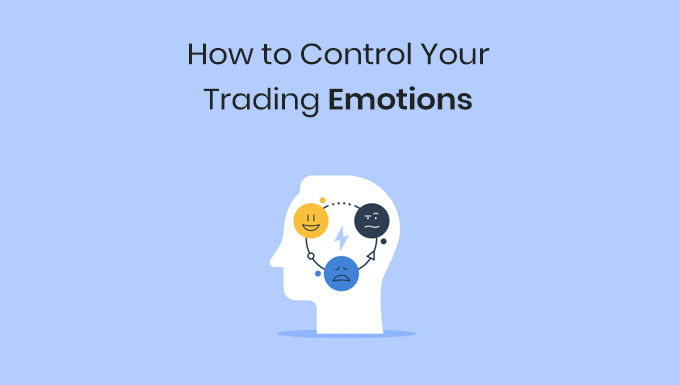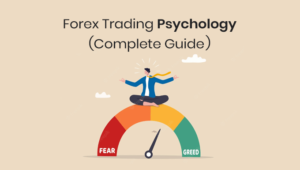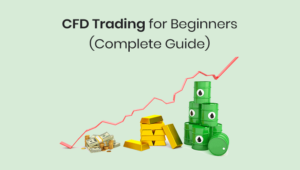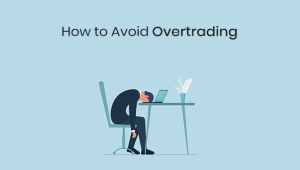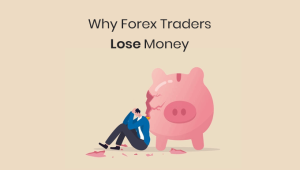Traders’ actions are largely driven by their emotions. And these trading emotions decide how successful the day is going to be for a trader, no matter what instrument they trade.
For many traders, “money” is a distinct value that can trigger greed and euphoria, but also fear and pressure.
The attraction of fast money leads many beginners to trade in derivatives, which can produce amazing results compared to traditional stock trading.
While you have to wait months or years with classic blue chips to achieve a 20–30% return, a trade with high leverage in Forex/CFD, options, or futures trading can produce this result in 5 minutes.
This fits perfectly with our impatience and our greedy desire to achieve results as quickly as possible.
Emotions are not bad for trading, but a trader needs to know how to deal with them properly and plan their actions accordingly.
So, if you start with the goal of trading to get rich as quickly as possible, you will very quickly get to know your true emotions and values. And those who are not aware of this and do not learn to deal with it will fail.
Therefore, it is necessary to come up with your own way to deal with trading emotions like greed and fear, if not you will quickly become a victim of their feelings and end up losing a lot of money.
Why Do We Get Emotional in Trading?
I laugh to myself every time someone says:
“I’m ready to accept mistakes!”
Honestly, nobody likes to accept mistakes. There are different ways that mistakes can be corrected and dealt with. And that’s it.
People don’t like being criticized. People think they are correct most of the time.
However, if you make a mistake while trading, remember that it was you who made the wrong decision about this trade. You are to blame.
A single bad trade is OK. A second bad trade too. After the third losing trade, things get uncomfortable and the trader reacts with anger.
After 3 losing trades, the trader who isn’t sure of himself starts to doubt his system and won’t like to accept this loss. Instead, the trader will make “revenge trades,” with bigger positions and end up with even bigger losses. This is a known circle.
What Can You Do to Control Your Trading Emotions?
Experienced traders always have the correct mindset when they trade. So, you should always ask yourself whether you have a good mindset to trade or whether something is making you lose focus.
If you have problems at home or if you are sick and it makes you feel bad, you shouldn’t trade.
To help you find the right balance, I’ll give you 6 tips that have helped me control my trading emotions.
1. Start with a demo account
Only trade with real money when you have found a proven strategy that shows constant profits. Backtest your trading strategy over a given period of time. If you don’t have a set of rules that tell you exactly when and how to place a trade, then leave it and practice on a demo account.
2. Learn to accept losses
It doesn’t matter if you have 3 losing trades and 1 winning trade. If these 3 losing trades had reasonable stop losses of -20 pips each and the winning trade resulted in +80 pips, then your system did work after all.
In the end, only the total matters!
3. Do not take counter trades
Fear of losses and wanting to get back the money lost quickly are the worst trading mistakes a trader can make.
It’s okay if you make a mistake since losses are a part of trading. But you should never try to make up for your losses by counter trading.
You must understand that you can only fix this mistake when there is another trading opportunity. And that opportunity can sometimes take days or even weeks, depending on your trading strategy.
4. Switch to a demo account after a losing streak
If you are already trading on a live account but are going through a losing streak then practice on a demo account for 1-2 days to regain the right feeling and confidence.
5. Take several breaks
Anyone who spends a lot of time in front of a computer screen loses focus after a while and tends to make bad decisions. Every so often, get up and go outside to get some fresh air to clear your mind.
6. Breathing exercises to get in balance
Many successful people work with meditation and breathing exercises every day to find the right balance.
I often do 2-3 minute breathing exercises in which I close my eyes and take deep breaths in and out. I especially like doing these exercises before risk events like the NFPs or interest rate decisions that are part of my trading setups.
7. Reduce position sizes
Keep your leverage low until you have full control over your trading system and have been making consistent profits for months. Then you can think about gradually increasing your position size.
8. Appreciate simple things
It might sound silly at first, but always remind yourself how lucky we are. We have a life to live. We have a place to sleep. We can buy and sell things. If you are truly thankful for what you have, your greed won’t get the best of you as often, which is very helpful for your trading.
I know that 90% of the readers who read these tips will forgot everything again in 3 minutes and implemented nothing.
If you really want to be a successful trader, you should be honest with yourself about your actions and use one or more of the tips here to get rid of trading emotions over time.
How I Deal With Losing and Trading Emotions
I have been in forex trading for over 10 years. I’ve been through a lot. Believe me, there were a lot of sleepless nights.
All positive and negative experiences were very valuable for me and they made me what I am today. A profitable day trader who has said goodbye to the get-rich-quick scheme and steadily earns more through constant profits.
But that was only possible if I got outside help at the right time and worked on my weak points, especially discipline and my mindset.
My self-confidence is so high today that nothing and nobody can throw me off balance. No stupid Facebook or Youtube comment, no know-it-all saying a trader has to make 50% a month. It bounces off me!
Of course, bad trades happen to me. Every day. But I don’t get overly annoyed about it anymore, or only when it doesn’t fully match my setup. This sometimes happens, but very rarely.
Conclusion
Confidence in trading is extremely important so that emotions can be controlled.
In order to gain confidence, you need a trading strategy that works. But even a proven strategy will not help you alone. Work at least as hard on your personal development, which is primarily your attitude towards life. I hope that the above tips will help you to overcome trading emotions.
